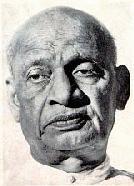|
It is a pity the Sardar's remarkable contribution
to the strengthening of secularism
in
India has not been properly appreciated
 Fifty years after India won freedom, the myth that Sardar Patel
was anti-Muslim persists. In this fascinating essay, Dr Rafiq Zakaria,
the respected scholar, reveals the truth about Patel
and India's Muslims.
Fifty years after India won freedom, the myth that Sardar Patel
was anti-Muslim persists. In this fascinating essay, Dr Rafiq Zakaria,
the respected scholar, reveals the truth about Patel
and India's Muslims.
As was his practice, the Sardar listened patiently to members
on both the sides; but expressed no opinion. Meanwhile a delegation
of some of the leading members of the minorities met Nehru and
pleaded for their right to propagate their religion. Nehru was
sympathetic but told them frankly that he did not believe in organised
religion and so he was unable to appreciate its propagation. But
this was, he said, his personal view; they should discuss it with
Patel and he was sure he would be more appreciative of their sentiments
and do the needful.
The Sardar heard them, when they saw him next,
with patience. He was amused at what Nehru had told them. He assured
them, however, that he would do whatever he could to help them
out. In the result, despite strong opposition, he exerted all
his prestige and influence to get the word 'propagate'
incorporated in Article 25 of the Constitution.
Likewise, it
was because of the Sardar's persuasion, that the Constituent Assembly
passed Articles 29 and 30, which have guaranteed to minorities,
the right to conserve their 'distinct language, script or
culture' and 'to establish and administer educational
institutions of their choice.' These constitute the arsenal
of their rights as enshrined in Chapter III of the Constitution
which is enforceable by the courts.
It is a pity that this remarkable
contribution of the Sardar to the strengthening of secularism
in India has not been properly appreciated; had he not put all
his weight behind their incorporation, the minorities might not
have been able to maintain their identities in India, as they
have been able to do.
There is also the evidence as recorded by General Roy Butcher,
a Britisher, who was then the commander-in-chief of the Indian
army. He was on cordial terms with the Sardar, who had developed
a special friendship with him. One day, while Patel was convalescing
at Dehra Dun, Butcher called on him in his chamber. They talked
for an hour on various issues. Butcher later put the account of
their conversation in writing.
One of the things that Patel emphatically
told Butcher was that 'everyone though that he was anti-Muslim
but that was not the case at all. He was quite ready to guarantee
the safety and well-being of Muslims all over India.'
In the last year of his life, Patel gave yet another proof of
his assertion that he was not anti-Muslim, this was in the case
of Justice Bashir Ahmed of the Madras high court, whom the Government
of India had proposed as a permanent judge of the Madras High Court.
Chief Justice Kania of the Supreme Court of India negatived the
proposal. When the file reached Prime Minister Nehru, he was furious,
he wrote on January 23, 1950 to Patel, who as home minister, was
directly in charge of such appointments, complaining against Kania's
attitude. Nehru angrily asked Patel, 'whether a person who
functions in this improper way is fit enough to be the head of
judiciary of India.'
He pointed out that he had discussed
the matter with Rajaji, who was then the governor-general of India
and hailed from Madras and he had fully agreed with him. He, therefore,
suggested that 'in view of these facts we would ask Chief
Justice Kania to resign. It would be a great risk to make him
the permanent Chief Justice of the Supreme Court. Of India.'
Excerpted from Sardar Patel and Indian Muslims, by Rafiq Zakaria, Bharatiya Vidya Bhavan, 1996, Rs 125, with the author's permission. Readers interested in buying a copy of the
book may write to Bharatiya Vidya Bhavan, Kulapati K M Munshi Marg, Bombay 400 007.
|

